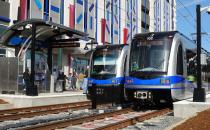Congress rejects President Trump’s infrastructure cuts
President Trump proposed steep cuts for federal infrastructure spending in a budget proposal SELC Senior Attorney Trip Pollard said would “take a sledgehammer to programs and projects with a proven track record of success.” Funding for public transportation and passenger rail would have been slashed, setting the stage for further cuts and shifting of funds as part of the Trump administration’s broader infrastructure plan.
Thankfully, Congress rejected the president’s proposal.
In the $1.3 trillion omnibus spending bill Trump reluctantly signed, funding for the Federal Transit Administration actually increased by $1 billion. Spending on public transit includes $1.5 billion for the New Starts program–while Trump had proposed eliminating capital programs for transit. This program is a critical component of funding for planned expansion of MARTA service in Atlanta, proposed light rail along the Durham-Chapel Hill corridor in North Carolina, and transit expansion proposals before Nashville voters next month.
Trump wanted dramatic cuts in rail funding as well, including chopping Amtrak spending in half. This proposal would have resulted in deep service reductions in the Southeast. Instead, Congress provided $3 billion for rail—an increase of over $1.3 billion over the prior fiscal year—including $1.95 billion for Amtrak. U.S. Representative Peter DeFazio called it “the most significant rail investment in a decade.”
The budget agreement, which also included significant increases for road and highway funding, was a clear rejection of Trump’s infrastructure priorities and demonstrated Congress members’ belief that Americans want meaningful steps to improve infrastructure.
When Trump, who had not been involved in negotiations for the omnibus spending bill, saw the budget bill, he made a last-minute threat of a veto on Twitter, before eventually signing it.
I am considering a VETO of the Omnibus Spending Bill based on the fact that the 800,000 plus DACA recipients have been totally abandoned by the Democrats (not even mentioned in Bill) and the BORDER WALL, which is desperately needed for our National Defense, is not fully funded.
— Donald J. Trump (@realDonaldTrump) March 23, 2018
The federal budget funds the government through September 30, so Congress will soon be debating the same issues again. SELC will counter any renewed attacks on transit and rail funding in future budget proposals from the administration, building upon public and congressional support for cleaner transportation options.

